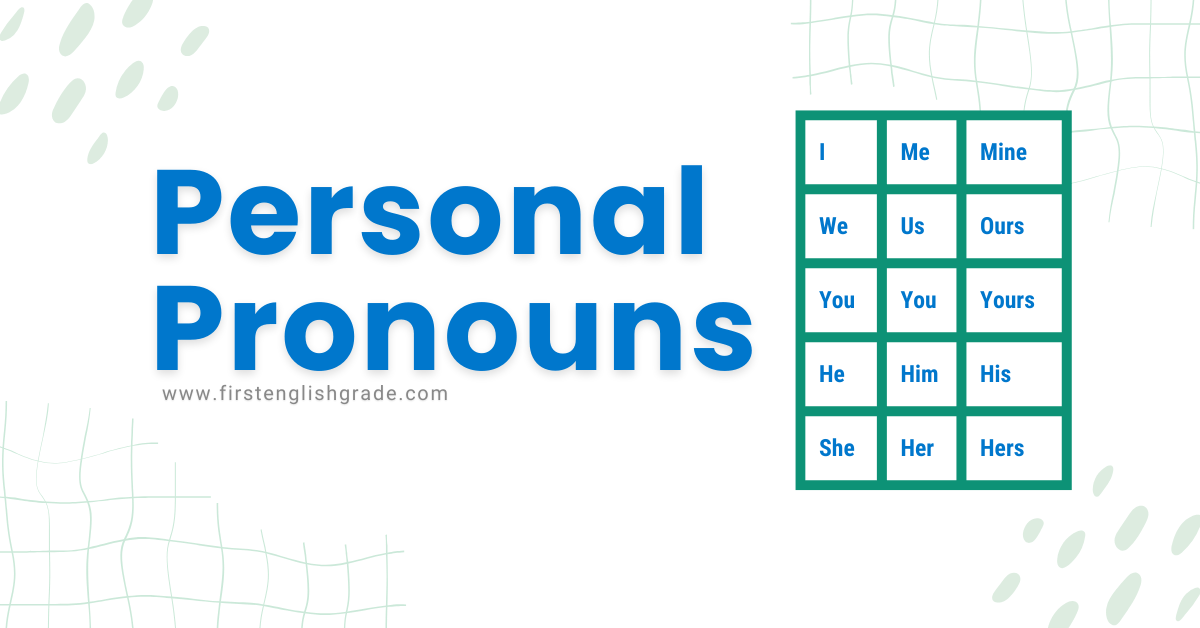Personal pronouns help us communicate more efficiently and avoid unnecessary repetition. Today, we’ll learn the definition of personal pronouns, explore different types of personal pronouns, and understand their usage.
Let’s dive right in and uncover the wonders of personal pronouns in English grammar!
What are Personal Pronouns?
Personal pronouns are a subcategory of pronouns that specifically refer to people or things. They stand in place of nouns, indicating the person speaking (first person), the person spoken to (second person), or the person or thing being spoken about (third person).
- First Person Pronouns: Refer to the speaker. Examples include “I” and “we.”
- Second Person Pronouns: These refer to the person or persons being addressed. The most common examples are “you” (singular) and “you” (plural).
- Third-Person Pronouns: These refer to individuals or objects that are being discussed but are not directly involved in the conversation. Examples include “he,” “she,” “it,” “they,” “him,” “her,” and “them.”
Personal pronouns help streamline communication by replacing nouns, thereby avoiding repetitive phrasing and enhancing the flow of language. Instead of repeating the same noun over and over in a sentence, we can use personal pronouns to make our language flow smoothly.
Just imagine how tiresome it would be if we always had to say “Monika went to the park, and Monika enjoyed the sunshine. Then, Monika met Monika’s friends, and Monika had a picnic with Monika’s friends.” Phew! Personal pronouns to the rescue!
Let’s revise the same example using personal pronouns:
“Monika went to the park, and she enjoyed the sunshine. Then, she met her friends, and they had a picnic together.”
By replacing the nouns with pronouns, the sentence becomes more concise and easier to read or listen to.
Personal Pronouns Examples: In A Sentence
- I am going to the supermarket.
- We won the game yesterday.
- You should take care of yourself.
- Are you coming to the party tonight?
- He is an excellent chef.
- She loves reading books.
- They are traveling to Europe.
Personal Pronouns List
Here is a list of personal pronouns in English:
- I
- You
- He
- She
- It
- We
- They
- Me
- You
- Him
- Her
- It
- Us
- Them
- My
- Your
- His
- Her
- Its
- Our
- Their
- Mine
- Yours
- His
- Hers
- Its
- Ours
- Theirs
- Myself
- Yourself
- Himself
- Herself
- Itself
- Ourselves
- Yourselves
- Themselves
Types of Personal Pronouns
Personal pronouns can vary based on the person (first person, second person, third person), number (singular or plural), and gender (in some languages). In English, personal pronouns are usually categorized as follows: subject pronouns, object pronouns, possessive pronouns, and reflexive pronouns.
| Person | Subject Pronoun | Object Pronoun | Possessive Pronoun | Reflexive Pronoun |
| First | I | Me | Mine | Myself |
| We | Us | Ours | Ourselves | |
| Second | You | You | Yours | Yourself |
| Yourselves | ||||
| Third | He | Him | His | Himself |
| She | Her | Hers | Herself | |
| It | It | Its | Itself | |
| They | Them | Theirs | Themselves |
Let’s get to know the personal pronouns in English a little better. Each type of personal pronoun has a unique job in a sentence, and we’ll take a closer look at them:
Subject Pronouns
These pronouns usually act as the subject of a sentence, and they’re the ones doing the action. For instance, “I love ice cream,” or “They went to the park.” Subject pronouns make conversations lively and engaging.
Here’s a handy table to illustrate them:
| Person | Singular | Plural |
| First | I | We |
| Second | You | You |
| Third | He/She/They | They |
Examples of Subject Pronoun: Used as the subject of a sentence.
- She is going to the park.
- We are studying for the exam.
Object Pronouns
On the other hand, object pronouns play the role of the receiver or the target of the action. When someone does something to someone or something, object pronouns come into play. Check out the table and examples below for clarity:
| Person | Singular | Plural |
| First | Me | Us |
| Second | You | You |
| Third | Him/Her/Them | Them |
Examples of Object Pronoun: Used as the object of a verb or preposition.
- He gave me a book.
- They invited us to the party.
Possessive Pronouns
Possessive pronouns indicate ownership. They show that something belongs to someone. Here’s a list to showcase these pronouns:
| Person | Singular | Plural |
| First | Mine | Ours |
| Second | Yours | Yours |
| Third | His/Hers/Their | Theirs |
Examples of Possessive Pronoun: Shows ownership, but stands alone without a noun.
- The phone is mine.
- Is this pen yours?
Reflexive Pronouns
Reflexive pronouns come into play when the subject of a sentence is also the object of the action. It’s like the subject is doing something to itself. Let’s look at the reflexive pronoun list:
| Person | Singular | Plural |
| First | Myself | Ourselves |
| Second | Yourself | Yourselves |
| Third | Himself/Herself/Themselves | Themselves |
Reflexive Pronoun Examples: When the subject and object of a sentence are the same.
- I hurt myself while playing.
- She reminded herself to finish the report.
Common Mistakes with Personal Pronouns
Here are some common errors with personal pronouns to be careful of:
1. Misusing “Me” and “I”:
Mistake: “Me and Mona went shopping.”
Correction: “Mona and I went shopping.”
Tip: Use “I” as the subject of a sentence and “me” as the object.
2. Incorrectly using an object pronoun instead of a subject pronoun:
Mistake: “Her and Tom went to the party.”
Correction: “She and Tom went to the party.”
Tip: Use subject pronouns when the pronoun is the subject of the sentence or clause.
3. Confusing possessive pronouns with contractions:
Mistake: “Your going to the concert?”
Correction: “You’re going to the concert?”
Tip: “Your” shows possession, like something belonging to you. On the other hand, “you’re” is a contraction of “you are,” combining the words “you” and “are.”
4. Failing to establish a clear reference to a pronoun:
Mistake: “Alex told James that he needs help.”
Correction: “Alex told James that James needs help.”
Tip: Ensure that the antecedent (the noun a pronoun refers to) is clear and definite.
5. Using reflexive pronouns when they are not needed:
Mistake: “He gave the book to myself.”
Correction: “He gave the book to me.”
Tip: Reflexive pronouns should only be used when the subject and object are the same.
Conclusion
Personal pronouns play a significant role in both written and spoken English. They bring clarity and conciseness to our conversations, essays, and stories. Using them correctly not only enhances your language skills but also makes you sound like a language maestro!




